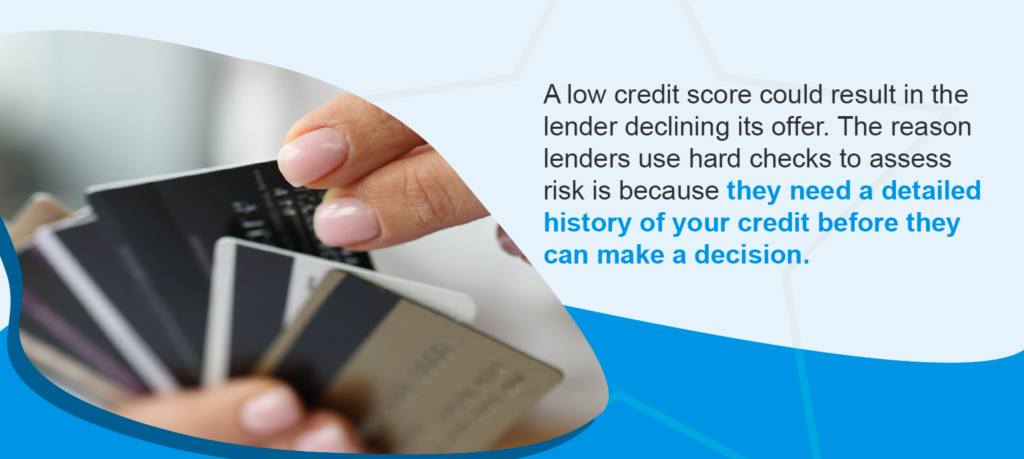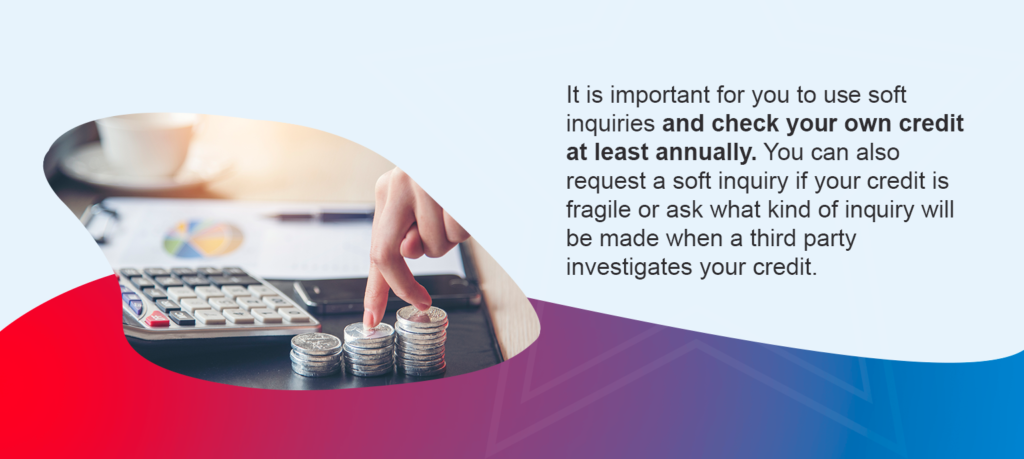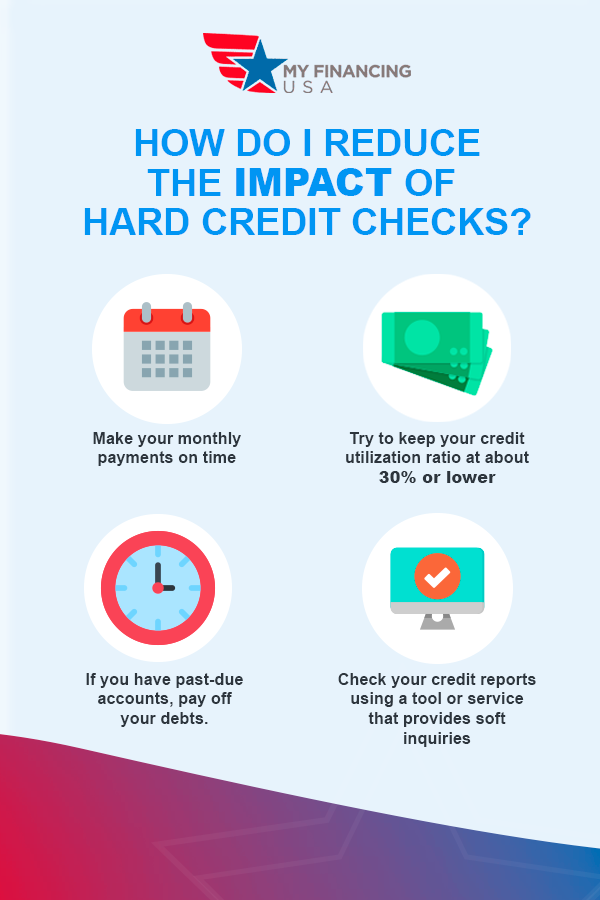When you're looking for the perfect recreational vehicle (RV) or boat, you have probably come across the need to pass a credit check. For information about the difference between a hard and soft credit check, continue reading our comprehensive guide.
What Is a Credit Inquiry?
When lenders check to see if your credit score is high enough to work with, they will make a hard inquiry into your credit, which is also called a hard credit check or a “hard pull." You can review a lender's hard check into your credit history from the major credit reporting agencies. Lenders make hard credit checks for information demonstrating how effectively you have used your credit in the past.
Your credit score is influenced by your ability to make timely payments on loans, credit cards and certain bills, such as those that were reported to collections. Lenders also want to check how many other credit lines you have and how long you've owned them. These factors all determine whether a lender will be willing to offer credit, which is also known as creditworthiness.
Credit Score Hard Check vs. Soft Check
A credit inquiry is either hard or soft. The main difference between a soft check vs. a hard check is that only the hard check affects your credit score.
What Is a Hard Inquiry?
A financial institution checks your credit to determine a lending decision, and they generally make a hard inquiry into your credit. A hard credit check might occur when you apply for a loan, mortgage or credit card, and you have to authorize for the check to occur during the application process.
A hard inquiry might be used:
- When a lender investigates your application: If you apply for a credit card or loan, the lender needs to determine if you are a good candidate to make monthly payments over an extended period. You might have about one month of enough income to meet the requirements, but you could still be a risky candidate if your income suddenly changes. This is why they investigate your credit history to get a larger picture of your spending habits.
- When a lender or bank decides whether to approve your application: If you apply for a mortgage, an auto loan or another kind of loan, the lender usually conducts a hard inquiry. Applying for larger sums makes it more difficult to get approved. Sometimes, a bank will pre-approve you for a loan of a set amount, and you will have to find a home or vehicle to fit in that price range.
- When you request a credit limit increase: If you have used a credit card for a while and want to increase your limit, the agency will use a hard inquiry to review your creditworthiness.
- When you submit a rental application for an apartment: Your landlord might use a hard inquiry to test your ability to pay rent reliably.
- When a collection agency conducts skip tracing: If you owe money, a collection agency might use a hard inquiry as part of the process to locate you.
The problem with hard inquiries is that they have the potential to lower your credit score, but only by a negligible amount. Applying for a credit card or loan that requires one hard inquiry is unlikely to prevent you from making any future applications or getting approved. In most cases, hard credit checks stay on your report for around two years before dropping.
When applicants run into problems caused by hard inquiries, it's usually because they have applied for numerous accounts within a few months. This results in multiple hard inquiries that make the applicant appear to be a high-risk borrower. It's best to space out your credit applications, especially if you are applying with credit card lenders.
Why Do Lenders Use Hard Credit Checks?

A lender assesses risk by reviewing your credit history. A low credit score could result in the lender declining its offer. The reason lenders use hard checks to assess risk is because they need a detailed history of your credit before they can make a decision.
Lenders use FICO and VantageScore credit scores to predict the likelihood that you will be late on a payment within the next two years. Failing to pay for 90 days is the amount of time it takes to default on a credit obligation. You could be the perfect customer if they give you the credit, but if the likelihood that you might cost them money is moderately high, they will withhold the offer.
What Is a Soft Inquiry?
A credit history check might involve a soft inquiry or "soft pull." Usually, a soft pull is done before you apply to be a borrower, and it can be conducted without your express permission. For example, a credit or loan issuer might check to see if you qualify for any potential offers. You can also check your own credit score with a soft pull to get a baseline of what your finances look like to lenders. An employer might also investigate a job candidate's credit using a soft pull.

A soft inquiry is ideal for:
- Looking into your own credit reports: You might need to check your credit before you start searching for lenders. If you know your exact credit score, you will know which lenders to avoid applying with based on their listed criteria.
- An employer conducting a background check: When an employer considers you to fill a position, they might want to check your credit history for red flags.
Why Are Soft Credit Checks Important?

A soft inquiry leaves your credit score alone. Some credit bureaus report them, but it's possible that a soft inquiry will go unlisted. When it's visible, only you can see your soft inquiries, so employers and credit issuers are unable to check for them.
It is important for you to use soft inquiries and check your own credit at least annually. You can also request a soft inquiry if your credit is fragile or ask what kind of inquiry will be made when a third party investigates your credit. Although many borrowers are concerned with soft credit checks vs. hard credit checks when they sign up for a new line of credit, most people with average credit scores can receive the necessary hard credit check without any problems.
Credit Checks FAQ
After learning the difference between hard and soft credit checks, you might have additional questions about inquiries into your credit. Below is a list of frequently asked questions about inquiries, checking your credit score, hard checks vs. soft checks and related topics.
How Do I Find Out If a Lender Uses Soft Credit Report Checks or Hard Inquiries?
The easiest way to know if a hard credit check will be made is to ask a representative from the company running the credit check. It also depends on what the credit check is used for. For example, if a lender needs to decide on approving you for an RV or boat loan, a hard check should be necessary. The specific approval process is up to the lender, and they are permitted to run a hard check with your consent.
What Should I Do About an Unfamiliar Inquiry on My Credit Report?
Remain calm if you see an unfamiliar inquiry that you don't know the origin of. First, consider these harmless possibilities:
- The lender used a third party: A creditor might have abbreviated their business name on the report or went through a parent company or partner responsible for running credit checks. Search online for the name listed on the unfamiliar entry, and try to locate a match to a company you recently applied with.
- You recently shopped for rates: Rate-shopping results in multiple entries on your credit report. This is because lenders compete for clients, and you might see unfamiliar inquiries as a result. If you apply for an RV loan, for example, the dealership might help you shop for the best possible rate by sending your application to compatible lenders. Certain lenders like My Financing USA will begin with a soft credit check, protecting your score from dropping during the matching process.
- It might be a soft check: The entry concerns a soft inquiry, which can be conducted without your permission. Credit card companies and banks will conduct soft inquiries before sending you special offers. They strategically select potential clients by pre-approving you for new lines of credit, making their offers more attractive, but qualifying for pre-approval only indicates that you might be a good candidate rather than guaranteeing approval.
The worst-case scenario for an unfamiliar inquiry is that you are the victim of credit fraud. If you are unable to match the inquiry to your actions or a lending agency that could have been assisting you in a search for the best rates, your identity might be compromised.
If you believe you are the victim of identity theft, the best actions you can take are to:
- Freeze your credit for security purposes.
- Contact the business that made the inquiry and explain your situation.
- Dispute the inquiry, which may result in its removal from your credit report.
- Contact the major credit reporting agencies about the issue, including Experian, Equifax and TransUnion.
- Add a fraud alert to your credit file.
- Ensure that the activity is reported to law-enforcement agencies that investigate credit fraud.
Will Rate-Shopping Hurt My Credit Score?
Rate-shopping is a common practice. When lenders see multiple inquiries for finding a loan on your credit history, they tend to view the collection of hard checks as a consistency rather than a red flag. Because hard checks made for the purpose of rate-shopping do affect your credit score, it's ideal to find a lender that uses soft credit checks for rate-shopping. You can view each individual entry when you check your credit history.
Is It Bad to Have Multiple Hard Credit Checks on My Record?
Consumers with multiple hard inquiries on their record within a year are more likely to miss making a credit payment than consumers without any recent credit inquiries. People who have multiple recent credit inquiries are also more likely to file for bankruptcy.
Having excessive hard credit inquiries for various loans is a red flag for lenders, just like high credit card utilization or a history of making late payments on other obligations.
How Do I Reduce the Impact of Hard Credit Checks?

Hard credit checks are usually unproblematic for your credit score, especially if you have a positive credit history that you have spent years accumulating. In most cases, hard checks temporarily lower your credit by a small amount. If you're concerned that you have applied for too many new credit lines recently, here are some tips to help boost your credit:
- Make your monthly payments on time.
- Try to keep your credit utilization ratio at about 30% or lower.
- If you have past-due accounts, pay off your debts.
- Avoid suddenly closing existing credit accounts, as their longevity actually helps insulate your credit score.
- Check your credit reports using a tool or service that provides soft inquiries to better understand your risk factors.
Can Utility Bill Companies Inquire Into My Credit or Affect My Credit?
Utility bill companies can use a soft credit check to determine how reliably you might pay your bills. They can also charge a security deposit for you to begin your services with them.
Utility companies generally lack the necessity to report your payments to the credit bureaus, unless you are delinquent on your payments. The utility company may contact a collection agency in that case, which could result in damage to your credit.
Get a Boat or RV Loan With My Financing USA
Now that you have a more in-depth understanding of hard and soft credit checks, consider applying for a loan with My Financing USA. We can assist you in finding a compatible lender to finance your new RV or boat to take on your cross-country adventures, even if your credit score would make getting approval elsewhere difficult.
Learn more about our RV Loans before making a final decision, or if you're in the market for a boat, get more detailed information about how our boat loans work. Ready to secure a loan? Apply today to finance your new boat or RV.



